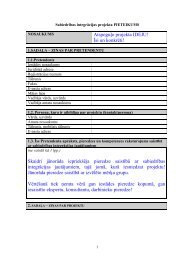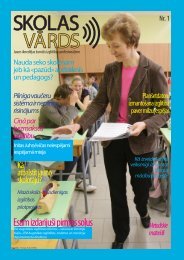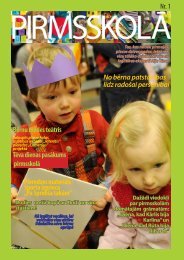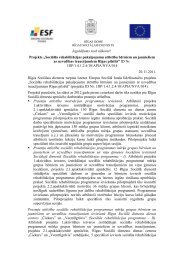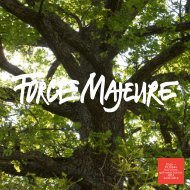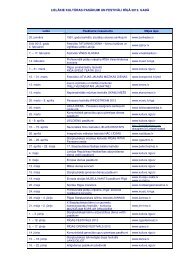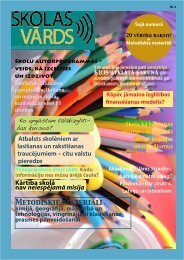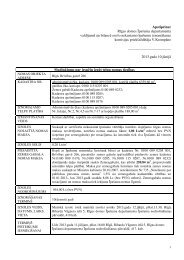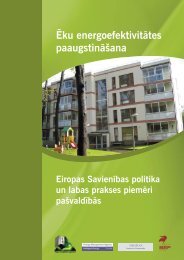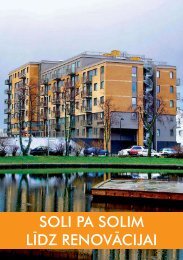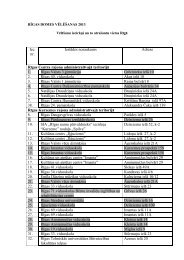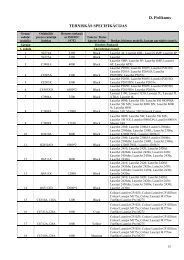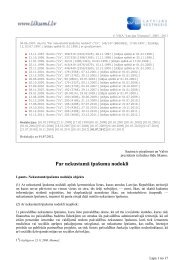Riga - European Capital of Culture 2014 candidate
Riga - European Capital of Culture 2014 candidate
Riga - European Capital of Culture 2014 candidate
- No tags were found...
You also want an ePaper? Increase the reach of your titles
YUMPU automatically turns print PDFs into web optimized ePapers that Google loves.
midsummer nightbonfires (līgo)Not so long ago, the summer solsticewas a solstice festival for the entire nation.This celebration marks the longestday and shortest night, it is the daywhen the sun has reached its highestpoint in the sky, when the flow <strong>of</strong> timeappears to stop for a moment. To prolongthe effect <strong>of</strong> light, bonfires are lit.At the <strong>2014</strong> solstice, <strong>Riga</strong> will inviteyou to celebrate the shortest night <strong>of</strong>the year, to come together and uniteneighbours from near and far, travellingfrom bonfire to bonfire.The origins <strong>of</strong> the summer solstice celebrationsreach back into the immeasurablepast – in the sun cults <strong>of</strong> the farmingpeople. Its origins can probably be datedat least to the era <strong>of</strong> the Indo-<strong>European</strong>community – 4000 or 5000 B.C. In the 12 thcentury, when German crusaders landedon the eastern Baltic shores, they were notin the least bit surprised by the revelriesand joy, by the bonfires flickering in thedark <strong>of</strong> night.During the 16 th and 17 th centuries on thenight <strong>of</strong> 24 th June, Midsummer bonfiresburned throughout Europe, starting fromthe British Isles and extending as far as theUrals. In Italy they were called San Giovannibonfires, in France – the Saint Jean bonfires.They are also burned in honour <strong>of</strong>Yan, John, Juan, Hans, Johannus, IvanKupala and, <strong>of</strong> course, Jānis. These bonfiresare lit on the highest hills everywhere,but in large villages and cities – in the centralsquare. Paris used to have a bonfire oneach city block, and the King <strong>of</strong>ten tookpart in the ceremony by lighting the SaintJean bonfire himself.It could safely be said that the summersolstice is the most popular Latvian celebration– lights, joviality, songs and thepeak <strong>of</strong> fertility. Of all the seasonal songs,Latvians have more Līgo songs than anyothers – particularly sonorous songs thatare sung at the midsummer solstice andwhich differ from other folk songs with theirspecific refrains: ‘līgo’, ‘rotā’ or ‘rūto’, dependingon the region in Latvia.It is said that on the night <strong>of</strong> the summer solstice,the sky opens and a fern blossomswith golden flowers – those who witnessthis can make a wish and it should cometrue. The flowering fern also has eroticsignificance – to search for the floweringfern means to select your other half on thisfertility night. Above all – Jānis’ mother (thehostess) makes cheese and Jānis’ father(the host) brews beer. The singing neverstops.In the city squares, there will be opportunitiesto learn about some <strong>of</strong> the festivaltraditions by going from bonfire to bonfirein several locations in the city. Folkloreand dance groups will involve everyonein songs devoted to the shortest night.They will also teach various dance steps,similar to <strong>Riga</strong>’s 800 th anniversary celebrationsin 2001, when tens <strong>of</strong> thousands <strong>of</strong>people actively participated in a truly upliftingemotional experience. Throughout theLīgo, also called Jāņi celebrations, an unconsciousjourney through different Indo-<strong>European</strong> traditions will be discovered inall regions <strong>of</strong> the city.What: National festival.Where: Throughout the city <strong>of</strong> <strong>Riga</strong> and inSigulda.When: 21 st June <strong>2014</strong>.Concept author and organizer: <strong>Riga</strong>’s ECCtask group.Cooperation partners: Folklore groups,craftsmen, dance groups.the great riga gameTo know and recognise <strong>Riga</strong>, to rediscoverit, to be oneself in one’s owncity. Or to get to know and discover anew <strong>Riga</strong>. An event for inquisitive andactive people.The “Great <strong>Riga</strong> Game” is an exciting orienteeringgame for grown-ups and childrenand is a traditional activity <strong>of</strong> <strong>Riga</strong>’s annualCity Festival. It is not just recreational innature, but also educational and has beendeveloped at several levels.In one <strong>of</strong> these levels, the “Great <strong>Riga</strong>Game” invites its players to orienteer notjust through the city, but also through thecenturies. Polish times, Swedish times,Russian or Tsarist times, times <strong>of</strong> the1 st song celebrationfor spectatorsSong celebrates a grand day today, all<strong>of</strong> the spectators are singing!Chorus singing traditions in Latvia areancient and strong. The Latvian SongCelebration takes place every fiveyears, and in between – the Youth SongCelebration. The choral movement is stillactive even in the years between the SongCelebrations. Begun during the festivities<strong>of</strong> <strong>Riga</strong>’s 800 th anniversary, spectator singalongswith choirs have become a populartradition. During Song Celebrations as wellas other large, urban events. The Songunites!The main idea behind the “1 st Song CelebrationFor Spectators” is to switch the customaryroles, bringing the spectator to theNational Awakening – various stages <strong>of</strong>history and changes experienced by thecity. To know the pace <strong>of</strong> history, to recognisea period by a characteristic historicalfact and connect it to a specific place inthe city – this is a challenge for both oldand young.When did the Calendar Unrests take place?Which public place was established inconnection with the Nystad Peace Treaty?Which is <strong>Riga</strong>’s first water tower? When didthe ‘good old Swedish times’ begin?Because answers to these questions atthis level will also be accessible on theInternet in foreign languages, anyone interestedin <strong>Riga</strong> will be able to take part.However, it will only be possible to play theentire game on the spot, as there are controlpoints to be visited and express tasksforefront. To place the spectators on themain Song Celebration stage platform, toallow each spectator to feel and experiencethe simultaneous responsibility andelation felt by choir singers during SongCelebration concerts. Anyone can becomea soloist at the 1 st Song Celebrationfor Spectators – the concert director givesthe microphone to a freely chosen singerand the spectator becomes a soloist onthe Mežaparks open-air stage.In order to achieve the full effect <strong>of</strong> a SongCelebration, there are plans to organize aspectator rehearsal, thereby providing thefeel <strong>of</strong> what it means for a choir to workwith a conductor, as well as introducing thespectator to the evening concert’s repertoire.Additionally, concert spectator andco-singer rows will be augmented by pr<strong>of</strong>essionalmusicians and choir singers.What: Concert rally after the Great Talka.Where: Mežaparks open-air stage.to be carried out.After visiting the many control points in differentlocations in <strong>Riga</strong>, the weary playerswill arrive at the Laboratory <strong>of</strong> Flavours on11. novembra Embankment. Taste budswill be challenged and delicious prizesawarded for correct answers.The grand prize will be won by those whohave completed the full set <strong>of</strong> tasks at alllevels <strong>of</strong> the game.What: Interactive game.Where: Throughout the city <strong>of</strong> <strong>Riga</strong>,cultural institutions.When: August <strong>2014</strong>, during the <strong>Riga</strong> CityFestival.Concept author and organizer: x-aģentūra.Cooperation partners: <strong>Riga</strong> Central Libraryand its branches, <strong>Riga</strong>’s museums.When: July <strong>2014</strong>.Concept author: “Untitled” LtdCooperation partner: League <strong>of</strong> <strong>Riga</strong>Choirs92 93



